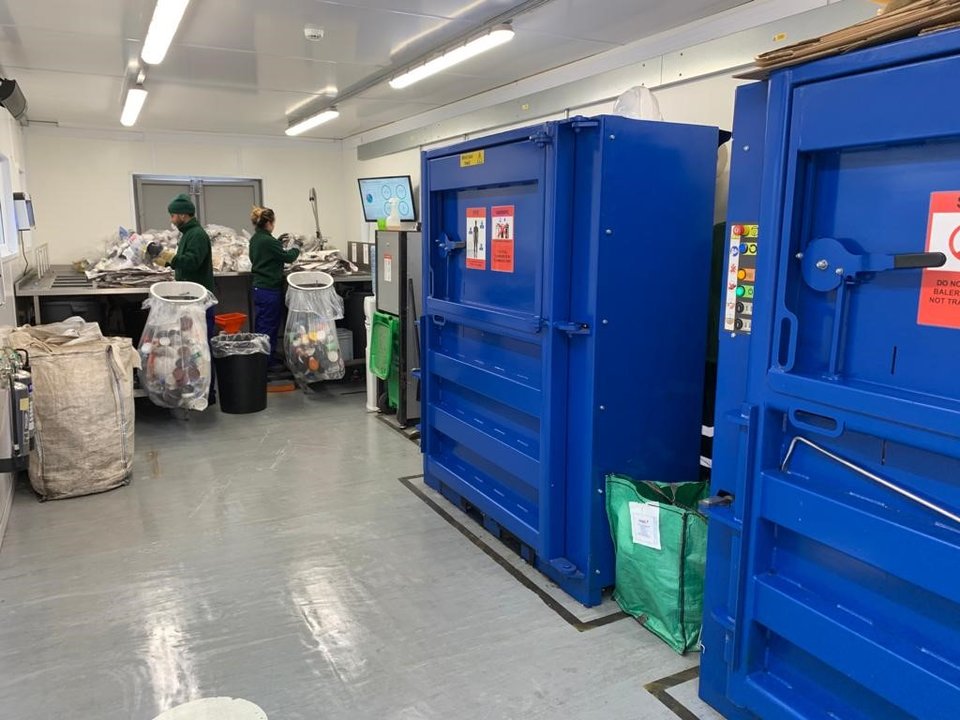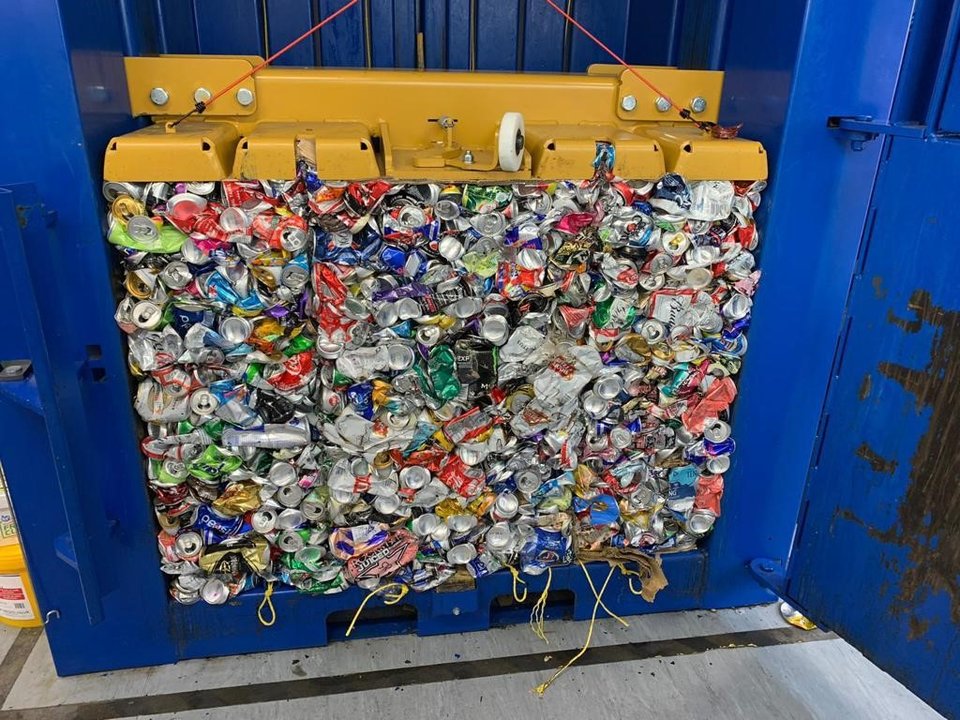Stations
A green solution for Brighton station: ramping up recycling
Train guards:
How cybersecurity is helping rail operators keep on track
Brighton station has been busy doing its part for the environment by installing a new mobile segregation unit that processes all waste collected from the station and trains. Frankie Youd profiles the new operation.
W
ith over 17 million passenger entries and exits recorded at the station from 2018 to 2019, Brighton station has earned the title of the seventh busiest station in the UK outside of London. Although this high passenger footfall to the station brings with it a number of benefits such as revenue, creation of jobs, and tourism opportunities, as with most areas with high footfall the issue of litter is an important one.
Started by Govia Thameslink Railway (GTR), a new recycling initiative aims to increase recycling rates at the station to 95% from its current 30%. At present, 12% of the total waste collected by Govia Thameslink Railway’s 800-mile network is sourced from Brighton station, which has been recorded to produce 650 tonnes of waste.
The incorporation of the recycling unit is thanks to a new partnership with sustainability start-up Green Block. The recycling unit at Brighton station is the second one to be installed within the UK, the first being located at London Victoria station, which was introduced in 2020.

Aerial view of the derailment. Image: UK Government
Recycle, recycle, recycle!
Developed by UK start-up company The Green Block – an improvement specialist business focussing in facilities management – the mobile segregation unit (MSU) is already making strides at Brighton.
Since being installed at the start of September, the MSU has prevented 32 tonnes of waste from being incinerated, by segregating it into the correct streams to be recycled and reused. It has been estimated that if the unit continues to remain at this level, 400 tonnes of waste will be recycled between now and September 2022.
Commenting on these figures Andy Williams, co-founder and director of The Green Block says: “The unit has already taken Brighton station’s waste from a recycling figure of 25% to 90.1% within two months. It is our ambition to get to 95%.

Staff sort waste at Brighton station. Credit: The Green Block
“We are currently looking at the prevention of waste coming into the station too, along with the ‘re-use’ of certain materials. It’s a cliché, but it is a journey, and one that we shall continue to work in a collaborative fashion with GTR, and the station’s excellent management team.”
The unit is able to segregate, wash, compact, bale, weigh, and electronically tag all waste that is placed into it – this rubbish will not only be collected from around the station, but from the trains themselves upon arrival at Brighton.
The inclusion of the unit at Brighton station came about following the successful installation of a unit at London Victoria station, managed by Network Rail.
The unit has already taken Brighton Station’s waste from a recycling figure of 25% to 90.1% within two months.
Speaking on the inclusion of the unit at Brighton station, Williams says: “The implementation of the Brighton mobile segregation Unit came from the success of the Network Rail MSU at London Victoria managed station, which took Network Rail’s total waste of 1,100 tonnes of dirty or co-mingled waste (passenger, station, and retail waste) recycling figures from 12.9% to 91.2%.
“GTR is a Train Operating Company (TOC) at Victoria, and were so impressed with the system that they implemented it at their Brighton station, which generates over 600 tonnes of co-mingled waste.”
The initiative was unveiled as part of National Recycling Week, which ran from 20–26 September this year, and has received high praise since its inclusion.
The green benefits
With over 1.5 billion individual rail journeys being made in the UK each year, prior to the pandemic, passengers generate tonnes of waste products with the majority of items not being recycled.
The UK Government has issued a target of 90% recycling of all station waste to be delivered by TOCs by the end of 2022. With the unit at Brighton managing both train operator waste and retail waste, it is able to achieve higher figures than other systems that mainly focus on retail waste.
Williams comments: “The key to railways is that our unit deals directly with train operators waste as well as retail waste. The difficult waste to manage is the passenger waste that is co-mingled, this is what sets us apart from the rest of the solutions in the marketplace.”
With the impressive figures so far due to the inclusion of the unit at Brighton station, it is hoped that the unit continues to drive these high recycle rates and exceed the government’s target.
The single largest benefit is that we have changed the behaviour towards the management of waste at Brighton.
Alongside the benefits of recycling materials, the unit has also provided jobs for people in Brighton, who have been given the title ‘waste wardens’. These ten individuals are in charge of managing and segregating the waste that goes into the unit.
Although the increased recycling rates and the creation of jobs are fantastic news for the station, The Green Block believes that the key benefit lays elsewhere, as Williams explains.
“It is our belief that the single largest benefit is that we have changed the behaviour towards the management of waste at Brighton. The culture and attitude have been reset through our intense education process, which is delivered through multiple workshops with TOCs, retailers, and station management teams.”
The future of recycling at stations
Although tonnes of waste that could have been recycled ends up in landfills across the UK every year, there is a strong sense of importance when it comes to recycling for the general public.
In a study carried out by UK waste management company Business Waste, from the 1,500 rail passengers surveyed, 82% of passengers said they would recycle their waste on board trains or at platforms if these facilities existed. Results showed that only 9% of passengers would take their waste home if they thought that it could be recycled.
Another potential concern is the public’s general level of intelligence: would the bins be used correctly?
With figures like this in mind, it poses the question of whether the rail industry should be doing more to ensure that waste is being recycled as much as possible on platforms and trains. However, issues of security and the risk of terrorism threats pose a key concern when it comes to bins at UK stations.
As well as safety, another potential concern is, frankly, the public’s general level of intelligence: would the bins be used correctly, ensuring that what was placed within the ‘recycling’ section of the bin could in fact be recycled?
To combat these concerns, having trained staff at stations segregating the waste behind the scenes offers an efficient method of ensuring the waste is sorted correctly in a safe and secure manner.

Compacted aluminium waste at Brighton station. Credit: The Green Block
Until the inclusion of recycling facilities within trains and stations is discussed and explored, success continues to grow from the MSU inclusion at London Victoria and Brighton. Due to the success, The Green Block are currently in discussion with several UK TOC’s as well as aiming to include units in stations in Europe and North America.
Speaking on future development for the company, Williams says: “We have some further innovative approaches that we believe make the railways in the UK even greener than they already are, and we are just delighted to be working within forward-thinking companies that are taking sustainability seriously within their organisation.”
With GTR and Network Rail making strides when it comes to achieving net-zero and decarbonisation goals an uptake of these units is hoped to be seen across more stations around the UK – providing a green solution for the rail industry’s waste worries.
Main image: The first Fuxing bullet train prepares to leave the Lhasa Railway Station on its inaugural journey. Credit: Dong Zhiwen/VCG via Getty Images